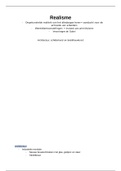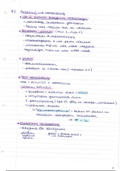Topic 4 – Attitudes
[Lecture notes]
An attitude is a psychological tendency that is expressed by evaluating a particular entity
with some degree of favour or disfavour.
- The valence of the attitude (positive – negative) can vary. Expressing an opinion on
something that you do not feel strongly positive or negative about can increase a
reaction time.
o When the strength is low: indifference
o When the strength is high: ambivalence
- The strength of the attitude influences how persistent the attitude is over time, how
resistant it is and how it influences cognition and behaviour.
o Extremity: deviates from neutrality
o Importance: personal investment
o Certainty: confidence
o Accessibility: ease of retrieval.
When measuring an attitude, one has to pay attention to:
- Two-dimensionality to capture ambivalence/indifference
- Measure attitude valence and strength
- Specific versus general attitudes must be considered
- More than 1 item per attitude
Attitudes can be measured both explicitly and implicitly. The latter is done by association.
Covert measures include:
- Evaluative Priming Task: attitudes as object-evaluation associations and EPT as
unobtrusive measure of attitude
- Implicit Association Task: measures implicit memory.
There’s a low correlation between explicit and implicit measures. This may be caused due to:
- Motivational biases in explicit self-reports (social desirability)
- Lack of introspective access
- Factors influencing retrieval from memory
- Method-related characteristics of the two measures
, The MODE-model
Attitude change
Two main approaches:
1. Persuasion paradigm
2. Evaluative conditioning: the change in evaluation of a target stimulus after pairing it
repeatedly with a valanced stimulus.
[Ch.3 book Gass & Seiter]
‘An attitude is a psychological tendency that is expressed by evaluating a particular entity
with some degree of favor or disfavor.’
Explicit Measures of Attitude
Self-Report Scales
- Likert scales
- Semantic differential scales: opposite adjectives that are placed as a scale
Visually Oriented Scales
- Visual analog scale (VAS): drawings of facial expressions on a continuum
Pitfalls in explicit measurements
- Social desirability bias
- Non-attitudes: instead of stating ‘I don’t know’, people create attitudes on the spot
- Mindfulness: one must be aware of their own attitude. This is often not the case.
[Lecture notes]
An attitude is a psychological tendency that is expressed by evaluating a particular entity
with some degree of favour or disfavour.
- The valence of the attitude (positive – negative) can vary. Expressing an opinion on
something that you do not feel strongly positive or negative about can increase a
reaction time.
o When the strength is low: indifference
o When the strength is high: ambivalence
- The strength of the attitude influences how persistent the attitude is over time, how
resistant it is and how it influences cognition and behaviour.
o Extremity: deviates from neutrality
o Importance: personal investment
o Certainty: confidence
o Accessibility: ease of retrieval.
When measuring an attitude, one has to pay attention to:
- Two-dimensionality to capture ambivalence/indifference
- Measure attitude valence and strength
- Specific versus general attitudes must be considered
- More than 1 item per attitude
Attitudes can be measured both explicitly and implicitly. The latter is done by association.
Covert measures include:
- Evaluative Priming Task: attitudes as object-evaluation associations and EPT as
unobtrusive measure of attitude
- Implicit Association Task: measures implicit memory.
There’s a low correlation between explicit and implicit measures. This may be caused due to:
- Motivational biases in explicit self-reports (social desirability)
- Lack of introspective access
- Factors influencing retrieval from memory
- Method-related characteristics of the two measures
, The MODE-model
Attitude change
Two main approaches:
1. Persuasion paradigm
2. Evaluative conditioning: the change in evaluation of a target stimulus after pairing it
repeatedly with a valanced stimulus.
[Ch.3 book Gass & Seiter]
‘An attitude is a psychological tendency that is expressed by evaluating a particular entity
with some degree of favor or disfavor.’
Explicit Measures of Attitude
Self-Report Scales
- Likert scales
- Semantic differential scales: opposite adjectives that are placed as a scale
Visually Oriented Scales
- Visual analog scale (VAS): drawings of facial expressions on a continuum
Pitfalls in explicit measurements
- Social desirability bias
- Non-attitudes: instead of stating ‘I don’t know’, people create attitudes on the spot
- Mindfulness: one must be aware of their own attitude. This is often not the case.






